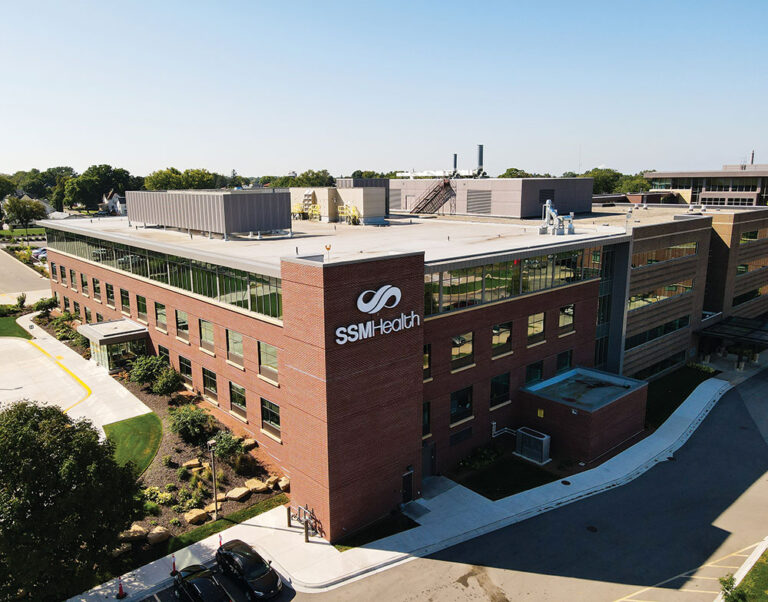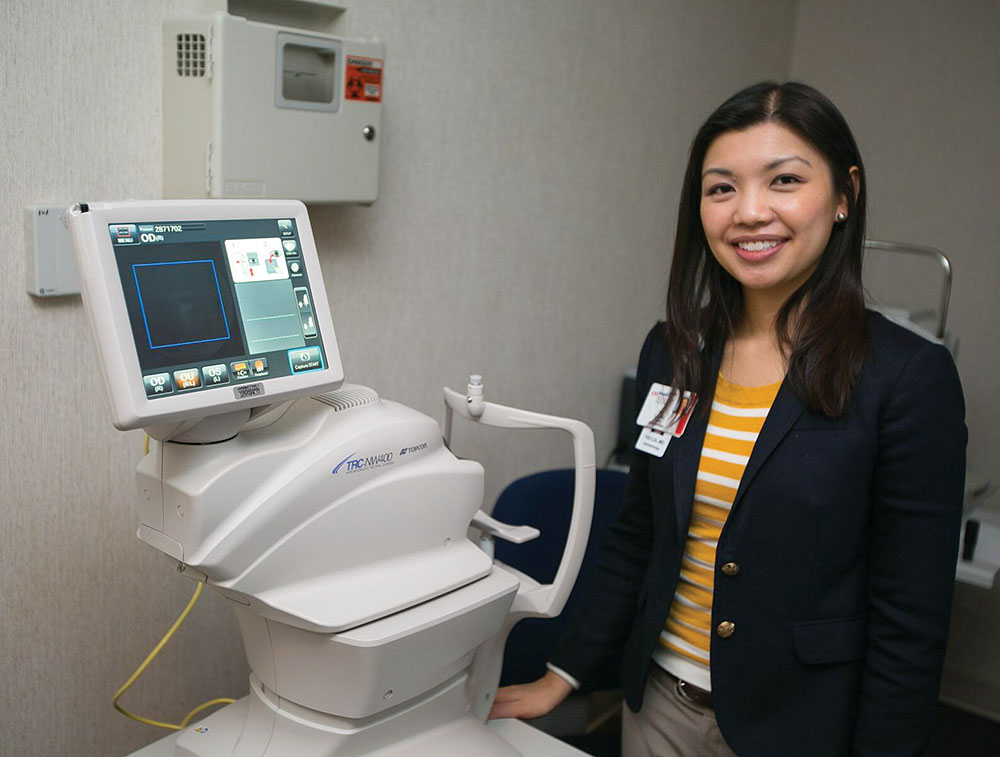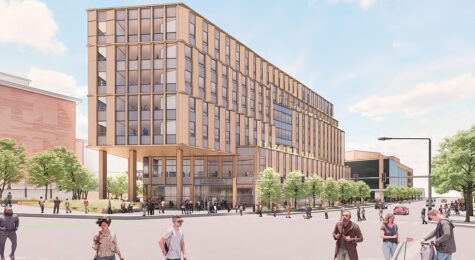The Madison Region’s Health Care Systems Are Among the Nation’s Best
In addition to the Madison Region's outstanding hospital options, Wisconsin’s rural outreach programs ensure health care for all.

Wisconsin consistently ranks as one of the best states in the nation based on the quality of its health care – and for good reason. Many major health care facilities in Madison and the surrounding communities make it a priority to extend care to the state’s sizable rural population, estimated to be 1.5 million residents in 45 rural counties.
On average, people living in rural communities are typically older, less insured and unwilling to travel long distances for care. So instead, the health care providers are coming to them.
In This Article
UW Health’s Teleophthalmology Program
There are more than 135,000 people in Wisconsin living with diabetes who are at risk for developing diabetic eye disease, yet less than half of those with diabetes receive yearly eye screening. Teleophthalmology represents an exciting solution to close the rural screening gap. In 2015, UW Health launched its Teleophthalmology Program to increase diabetic eye screening and treatment in rural communities.
The program operates out of 14 primary care clinics in six health systems, and the following are located in the Madison Region: Mile Bluff (five clinics in Juneau and Sauk counties); Reedsburg (Sauk County); Fort HealthCare (three clinics in Jefferson and Walworth counties); UW Health (two clinics in Dane County); and Access Community Health Centers (two clinics in Dane County).
Early feedback from the program has been very promising.

“Getting eye screenings and treatment early makes it much more likely that we can prevent blindness from diabetes, preserving a patient’s vision and their independence.”
Dr. Yao Liu, program director
Family Medicine Residency
In 2014, SSM Health Monroe Hospital in Green County developed a Family Medicine Residency program to provide comprehensive training of physicians committed to rural practice.
The program, one of the first osteopathic rural programs in the country, allows for ample teaching and hands-on experience due to the limited number of residents admitted to the program. They have three residents per year, and each resident has a panel of approximately 1,700 patients. Their rotations in clinic, inpatient and outpatient, and the emergency department provide a solid foundation for a variety of careers in family medicine.
“We’re really proud that 87% of our graduates are practicing in Wisconsin and 62% of our graduates serve in rural communities across the U.S. It’s an honor to help train the future of rural health care providers,” says Rebecca Bordner, marketing and communications coordinator at SSM Health Monroe Hospital.
Education, Careers & Opportunity
Goal: Make Child Care in Madison More Accessible
Programs are working to grow the market while also offering tuition assistance.
Rural Residency Assistance Program
In 2021, Mercyhealth was the recipient of a grant from the Wisconsin Rural Physician Residency Assistance Program (WRPRAP), established to promote collaboration among health systems and state agencies that aim to make rural Wisconsin a healthier place to live, work and play.
The grant was applied for by Dr. Suhail Shaikh, program director of Mercyhealth Family Medicine Residency Program Janesville. Funds from this grant will be used to support the administrative costs of a newly developed three-year training track that will address the need for additional physicians to practice medicine in rural Wisconsin communities.
“Physician shortage is a real crisis and negatively impacts our communities and patients,” says Dr. Shaikh. “We are excited about starting the rural residency in Walworth as we hope that physicians trained in rural communities will practice rurally and meet the ongoing needs of our communities.”
Critical Access Hospitals
Wisconsin’s Critical Access Hospitals (CAHs) were recently recognized as the best in the nation by the federal Health Resources and Services Administration (HRSA) for outstanding quality performance. CAHs are hospitals with fewer than 25 beds that provide essential services in rural areas when someone has a severe injury or illness, an urgent medical condition or is recovering from surgery. In the Dairy State, there are 58 CAHs.
“Rural hospitals provide a safety net of care that reaches every corner of our state,” says Eric Borgerding, president and CEO of the Wisconsin Hospital Association. “We are proud to work with our rural hospitals on projects that improve the quality of care they deliver every day to patients.”
Health Care Facilities in Madison
No matter where you live, the residents of the Madison Region have plenty of great choices of providers for their health care needs, including he following:
- American Family Children’s Hospital: A member of the UW Health system, the 111-bed facility in Madison includes a 26-bed Level IV neonatal intensive care unit, Level I pediatric trauma center and a burn center. The hospital has been cited for specialty services, including pediatric cardiology, neonatology, nephrology and gastroenterology.
- Mercyhealth: This regional health system features seven hospitals and 85 primary and specialty care locations throughout northern Illinois and southern Wisconsin. As an integrated health care provider, it provides services in four core divisions: hospital-based services, clinic-based services, post-acute care and retail services, and a wholly-owned insurance company. Mercyhealth offers more than 125 specialty and subspecialty services, including orthopedic surgery, prehospital emergency services and training, neurosurgery, heart and vascular services, cancer care, and plastic and reconstructive surgery. The organization also specializes in obstetric, neonatal and pediatric services.
- SSM Health: The Catholic-affiliated, not-for-profit health system is one of the largest employers in every community it serves. The SSM Health Dean Medical Group, established in Madison in 1904, serves patients at more than 60 clinics in south-central Wisconsin. The group includes SSM Health Davis Duehr Dean Eye Care, insurance provider Dean Health Plan and pharmacy benefits company Navitus Health Solutions. Approximately 500 physicians provide primary, specialty and tertiary care in the clinics. In addition, the system serves more than 400,000 health plan members.
- UnityPoint Health-Meriter: A part of UnityPoint Health and a UW Health partner, the 448-bed hospital lays claim to the busiest birthing center in Wisconsin. In addition to the not-for-profit hospital, UnityPoint Health-Meriter also serves families through primary care clinics, home health care services, laboratory services and, through its UnityPoint- Meriter Foundation, various charities and philanthropic activities.
- Select Specialty Hospitals: This critical illness recovery facility offers patients with medically complex conditions the ability to continue their recovery to regain their quality of life. Physician-led, multi-disciplinary care teams support that recovery by developing a customized treatment plan that helps patients breathe, eat, walk, talk and cognate again.
– Val Hunt Beerbower contributed to this article.
Get to Know the Madison Region
Want to learn more about living and working in the Madison Region of Wisconsin? Check out the latest edition of Livability Madison Region Economic Development.



